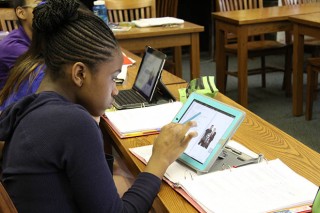We’ve all seen it lately. Students – and adults – leaning over, glued to their mobile devices. It is so prevalent that there is a medical term defining it; text neck.
More worrisome is the fear that students are not gaining the social skills necessary to succeed in a global world where collaboration and communication skills are at a premium.
That is exactly why theater is a wonderful remedy.
“Theater forces young people to connect with each other,” says Mrs. Naghib, the director of the annual Shakespeare play. “You can’t text a line to the audience; you can’t build the set on your iPad. You have to bring your whole self to the production; you have to be in the present.”
In fact, the performance of and preparation for a production, like Macbeth, is a terrific example of fostering 21st Century Skills:
Collaboration & Teamwork
Communication Skills
Critical Thinking
Theater teaches us through a unique learning style. Obviously, we hone our communication skills – such as enunciation, projection, memorization – but we also learn to support one another other under a unified goal.
Without collaboration, the production would fail miserably. Students work together to build the set. They collaborate to pull together a scene. They coordinate lighting and sound to All very integral parts of a production.
But one of the most undervalued experiences in theater is the way it nurtures critical thinking skills. “To truly master a part, actors must immerse themselves in the role, says Mrs. Naghib. “If it is an older production and we are bringing it to the present time, we must be able to understand the differences in the setting.”
It isn’t easy… (View video above to learn more)



Starting early with Shakespeare. Full participation in plays (that is, each child on stage, not simply the “theatre kids”) starting in Kindergarten. See “6 reasons to learn Shakespeare before Middle School” http://www.aspencountryday.org/page.cfm?p=544&newsid=170